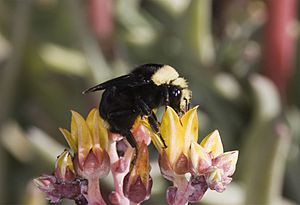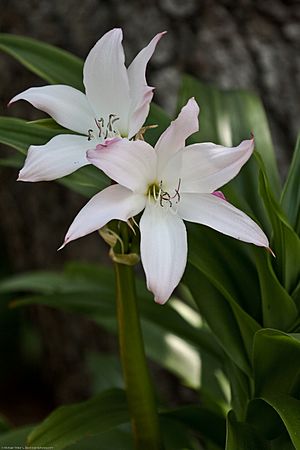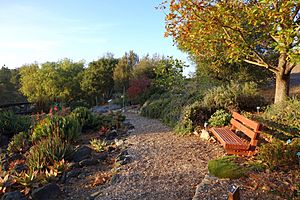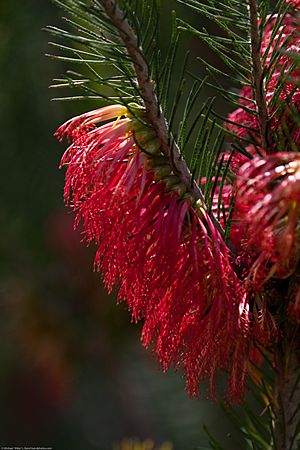San Luis Obispo Botanical Garden facts for kids


The San Luis Obispo Botanical Garden is a special place where you can explore plants from all over the world! It's a botanical garden located in the beautiful rolling hills of El Chorro Regional Park. You can find it between the cities of San Luis Obispo and Morro Bay in San Luis Obispo County, right on the Central Coast of California.
When it's finished, this garden will be huge, covering about 150 acres. It will show off many different plants from the five Mediterranean climate zones around the world. These zones include the Mediterranean Basin (around the Mediterranean Sea), California, Chile, Australia, and South Africa.
History
The idea for this amazing garden started in 1989. Then, in 1991, a group called "Friends of SLO Botanical Garden" was officially formed.
In 1993, the garden signed a 40-year agreement with San Luis Obispo County. This agreement allowed them to use 150 acres of land. A smaller "Preview Garden," about 2 acres, opened in 1997. This gave visitors a sneak peek of what was to come.
By 1998, the main plan for the garden was complete. A greenhouse and nursery were also built. In 2007, a large educational center opened. It was 4,000 square feet and built using green, sustainable methods.
Work is still happening to build the entire garden. Once it's all done, the San Luis Obispo Botanical Garden will be one of the biggest botanical gardens in the Western United States.
Gardens
The San Luis Obispo Botanical Garden is creating special areas for plants from different parts of the world. These areas are called ecoregions. They are all part of the Mediterranean forests, woodlands, and scrub Biome, which means they have similar climates.
Mediterranean Gardens
- The California chaparral and woodlands garden will be very large, about 47.40 acres. It will have nine different sections. These include oak woodlands, mixed evergreen forests, and grasslands. You will also see coastal scrub and chaparral plants. This garden will show plants from Baja California all the way up to northern California.
- The Mediterranean Basin garden will be about 11.50 acres. It will have three main parts. These are an oasis area, a Canary Island crest, and a Mediterranean slope.
- The Chilean Matorral garden will cover about 20.43 acres. It will focus on plants from central Chile. This garden will have seven different collections. You can find araucaria crests and southern beech forests here. There will also be coastal matorral and Chilean palm groves.
- The Cape Province of South Africa garden will be about 7.63 acres. It will feature three collections. One part will have many Cape succulents. This area is famous for having the most types of succulents in the world. Other parts will show a "floral carpet" and a mix of different shrubs.
- The Southwest Australia garden will be about 12.50 acres. It will have four collections from two areas of Australia. You will see a garden of the protea family. There will also be kwongan, which are small groups of eucalyptus trees. Another section will feature karri, marri, and jarrah forests. These are giant eucalyptus trees, some of the tallest trees on Earth.
Theme Gardens
- The Orchard, Vineyard and Entry Plantings will be about 12 acres. This area will show plants that are important for food and economy. You will see orchards of grapes, walnuts, pistachios, and olives. These are all productive plants from Mediterranean climate areas. The entry road will also have an avenue of Mediterranean cypress trees.
- The Gardens of Exploration will be about 11 acres. This section will have different demonstration gardens. These gardens will focus on five main areas. They include horticultural therapy, ecology, and biology. You can also learn about cultural influences and horticultural opportunities.
See also
 In Spanish: Jardín botánico de San Luis Obispo para niños
In Spanish: Jardín botánico de San Luis Obispo para niños
 | James B. Knighten |
 | Azellia White |
 | Willa Brown |



